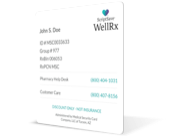Copyright 2025
Medical Security Card Company, LLC
All Rights Reserved
We take the privacy of your personal information seriously. By signing up I agree to WellRx's terms of use and privacy policy.
By Libby Pellegrini MMS, PA-C
High blood pressure, also known as “hypertension,” is one of the most common medical conditions that brings people into the doctor's office. In fact, nearly half of American adults have hypertension.
The tricky thing about high blood pressure is that you may not know that you have it… because most people don’t have symptoms of high blood pressure in the early stages.
Often, you can manage blood pressure with lifestyle changes alone, such as exercise and diet modification.
If these measures aren’t helping enough, your doctor can help you find the best medicine for high blood pressure so you can avoid long-term complications like heart disease and kidney disease.
Properly identifying and treating high blood pressure with medication to lower blood pressure can help you live a longer and healthier life.
To determine if you need to start taking high blood pressure meds, your provider will likely examine your whole health status, including your age, race, and other health conditions.
Dividing blood pressure into the following stages can help your prescriber determine the best medicine for high blood pressure.
Hypertension is measured as a ratio between the pressure on the walls of your arteries when your heart muscle is contracting the hardest and the pressure on the walls of your arteries when your heart muscle is the most relaxed.
This is also known as your “systolic” blood pressure over your “diastolic” blood pressure.:
In addition to suggesting lifestyle changes, your medical provider can work with you to determine the best hypertension medication.
There are several types of blood pressure medications, so remembering the medication names can be intimidating. However, it’s often simplest to consider the medications in terms of their class, or type.
A diuretic medication can help lower your blood pressure by taking fluid out of the circulatory system through a process known as “diuresis.”
A diuretic medicine works with your kidneys to help remove water and salt from the bloodstream via urination (this is why they are sometimes called “water pills”).
There are a few different types of diuretics. Thiazide-type diuretics:
Loop diuretics:
Potassium-sparing diuretics:
Calcium channel blockers work by relaxing the walls of the blood vessels (this is known as “vasodilation”) and reducing the force exerted by the heart muscle (known as “cardiac contractility”).
Common calcium channel blocker names include:
These medications help reduce the effect of a hormone (angiotensin) that narrows blood vessels. This can help reduce your blood pressure.
Both ACE inhibitors and ARBs can be beneficial if you have kidney disease or heart failure. ACE Inhibitors:
ARBs:
Beta-blockers help reduce your blood pressure by blocking the action of hormones that drive up your heart rate.
These medications are not typically used alone but in combination with other medications to control blood pressure. They include:
Several popular blood pressure medications can help keep your blood pressure within a safe range.
Common blood pressure meds are typically used at the safest and lowest dose necessary.
The most common blood pressure medication is typically used as monotherapy, but it can be combined with others to achieve the best possible control.
Hydrochlorothiazide is one of the best medicines for high blood pressure and one of the most commonly prescribed, as well.
It is a diuretic that helps reduce blood pressure by reducing blood volume. It is often used alone or in combination with other medications.
Amlodipine is a calcium channel blocker medication that works to reduce blood pressure by relaxing the walls of blood vessels and the force of the heart’s contractions.
It is “cardioprotective,” meaning that it reduces the risk of suffering a heart-related event such as a heart attack.
Lisinopril is an ACE inhibitor that helps reduce blood pressure by limiting a hormone that can narrow blood vessels and drive up blood pressure.
Lisinopril is especially beneficial for people with high blood pressure who also have chronic kidney disease.
What is the best blood pressure medicine? Many blood pressure medications can help control your blood pressure. However, the best blood pressure medicine is usually the medicine that is the safest and that can be used at the lowest dose.
The high blood pressure medication names below are often the best and safest blood pressure medications.
| Antibiotic | Drug Class | Common Dosage (Adults) | WellRx Savings Card |
| Hydrochlorothiazide (HCTZ) | Thiazide diuretics | 25mg | Link Out |
| Lisinopril | ACE-Inhibitors | 5mg | Link Out |
| Amlodipine | Calcium Channel Blockers | 5mg | Link Out |
No. The US Food and Drug Administration (FDA) has not approved any over-the-counter blood pressure medications.
The safest blood pressure medication is one that is prescribed by your provider and monitored over time for efficacy and side effects.
How long does it take for BP meds to work? When you first start taking a blood pressure medication, it can take a few weeks to work maximally.
Daily, oral blood pressure medications usually start to kick in within a few hours and their effects last for about 24 hours.
Choosing the best medicine for high blood pressure often boils down to a few key considerations, in addition to the primary consideration of what is the safest blood pressure medication.
Determining your blood pressure level, or stage, can help your prescriber choose a blood pressure medication.
If you have a low stage, one medication (monotherapy) may be effective. However, at a higher stage, more than one medication may be more useful.
Your provider will consider your health history when choosing a blood pressure medication, including whether you have chronic kidney disease, heart failure, or diabetes.
Certain blood pressure medications help more when used with these conditions.
Another important factor when choosing a blood pressure medication is the side effects. For example, a common class of medications, diuretics, can increase nighttime urination.
If you’ve been diagnosed with high blood pressure, clinicians will work with you to find the safest low-dose blood pressure medication.
If you’re trying to prevent high blood pressure, there are a number of habits that you can adopt today to reduce your risk of developing the condition and the need to use medication to lower blood pressure.
These habits include:
Get your free WellRX account and start saving on your medications
| To save on the best high blood pressure medications, sign up for your free WellRx account here . |
It can take a few weeks of consistently taking your blood pressure medication for your system to adjust to the new medicine and optimize your blood pressure.
The same principle applies when changing the dose of a blood pressure medication or adding a secondary medication.
The answer depends on what type of medication for blood pressure you have been prescribed.
Many clinicians recommend taking blood pressure medications before bedtime. However, it may be best to take diuretic medications in the morning, or at least 6 hours before bedtime, to reduce unwanted side effects such as nighttime urination.
Before switching your medications, make sure to consult your clinician. Together, you can work to switch your blood pressure medications if that makes sense for your individual health needs.
Most clinicians will suggest a staggered approach, especially if you are taking more than one medication for high blood pressure.
Many blood pressure medications may not be right for your particular health situation.
One medication that may be beneficial for a certain individual may actually be the worst blood pressure medication for another individual with a different health history.
Make sure to talk to your clinician about medicines to avoid.
If you have very high blood pressure, or your blood pressure is hard to get under control, it may be appropriate for you to take more than one hypertension medication.
Often, controlling blood pressure with more than one medicine can help safely lower your blood pressure, even if it is very high.
A number of hypertension medications are safe during pregnancy. These include methyldopa (one of the oldest high-blood pressure medicines) and labetalol.
It is important to talk to your clinician about blood pressure control in pregnancy and to avoid certain medication classes such as ACE inhibitors and ARBs.
Controlling blood pressure as you age is important to help you avoid long-term consequences of high blood pressure, such as heart attack and stroke.
Some blood pressure medications are preferable in older people with certain health conditions. For example, chlorthalidone, a diuretic, has been shown to help reduce the incidence of hip fractures in older patients with osteoporosis.
Research suggests the best medication for high blood pressure in Afro-American patients is typically a diuretic or a calcium channel blocker. Medications that are in the ACE inhibitor class or ARB class may not be as effective in Afro-American patients; however, they may still be considered on a case-by-case basis.
If you are diabetic, you have a higher risk of having chronic kidney disease.
In people with chronic kidney disease, an ACE inhibitor or ARB may be most beneficial.
If you have a history of a heart attack, ACE inhibitors or ARBs may also help protect your heart.

For your convenience, use the ScriptSave® WellRx mobile app. Now savings are well in hand, right at the pharmacy counter. Save on your family's prescription medicines.
Learn More
Your choice. Get a ScriptSave WellRx Savings Card. Or Download the free mobile app from the App Store or Google Play Store
Get A Card
ScriptSave WellRx Grocery Guidance leverages leading-edge nutritional data science to help you know which food products on your grocery store shelf are truly good for YOU.
Healthy Foods For YouTags:

November 07, 2024

October 23, 2024

October 02, 2024
You need to log into the site to use this feature
This feature requires registration. Sign up or log in to your free WellRx account to gain access to this and other tools to help make managing your medications and wellness easier.
Benefits Include:
 Store & manage your medication list
Store & manage your medication list
 Medication pricing updates
Medication pricing updates
 Medication information
Medication information
 Pill & refill reminders
Pill & refill reminders
 Medication journal & mood log
Medication journal & mood log
This feature requires registration. Sign up or log in to your free WellRx account to gain access to this and other tools to help make managing your medications and wellness easier.
Benefits Include:
 Store & manage your medication list
Store & manage your medication list
 Medication pricing updates
Medication pricing updates
 Medication information
Medication information
 Pill & refill reminders
Pill & refill reminders
 Medication journal & mood log
Medication journal & mood log
You will be redirected to your program in 5 seconds.
Our Terms and Conditions and Privacy Policy have recently been updated.
By declining you will be logged out of your account